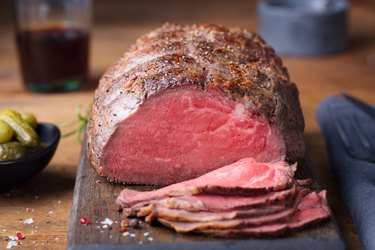
Sunday meals with the family, dinner parties, cooking for a loved one on a romantic evening — a good roast serves as the centerpiece to a meaningful meal. But with the various types of cuts available, arming yourself with knowledge of the best roast cut can take your cooking up a notch.
Tip
The most tender oven roasts are those that have plenty of fat marbling and come from the least-exercised parts of the cow.
Video of the Day
Read more: 5 Healthy Red Meat Recipes That Satisfy
Video of the Day
Choosing a Good Roast
The best roasts typically come with the most expensive price tags and heavy amounts of fat marbling. To purchase a good roast, the following tips can help you shop for top-quality meat:
- Look for the right cuts. According to the USDA,
cuts from the minimally used part of the animal, which include the tenderloin,
rib, front end and forequarter, always offer the most tenderness. Because they
only make up a small portion of the entire animal, they stay in demand and can
command a premium price.
- The rib section of the cow produces the most tender, and often
the most flavorful, roasts. When shopping, look for first cut, second cut and
ribeye.
- The first cut, also known as prime rib, loin end or small end, is the
most flavorful.
- The second cut, which comes from the ribs' large
end, is as tender as the prime rib cut, but it is slightly less tasty.
- The short loin (also known as tenderloin), which sits behind the ribs and in front of the
sirloin, also contains tender, savory meat. Like the roasts from the rib section,
tenderloin retains most of its tenderness whether cooked to medium-rare, medium
or well-done.
Cooking Tips for Roasts
For beginner chefs, cooking meat can often feel intimating. To get you started, follow these tips to not waste meat, cook your protein in a healthy way and stay on budget:
- For a rib roast, you should cook at least 1/2 pound per person and buy it at least two ribs thick, per the USDA.
- The ribeye, the meaty, boneless heart of the standing rib,
offers slightly less tenderness and savory taste than other rib cuts. For a ribeye roast, you should allow for at least a third of a pound per
person, according to the USDA.
- Keep it low fat, if desired. If eating healthy is a high priority for you, consider braising a leaner cut of beef,
such as a top or bottom round roast, to make a tender and flavorful pot roast. Meat
that comes from the chuck portion of the cow contains plenty of
well-exercised muscle and connective tissue that creates a toughness. When
braised over low temperatures for a long period of time, however, the beef
becomes tender. When cooking, you should allow for at least one-third of a pound per person,
per the USDA.
- Make a pot roast with a cheaper cut. According to the USDA, the best
roast for pot roast is a shoulder arm, which is a less pricey cut. You can
either braise the shoulder arm for two to three hours or cook it over low temperatures in a slow cooker. You can also add vegetables for a well-rounded dish. As an added bonus, according to an October 2015 study from the Iranian Journal of Public Health, intake of vegetables can reduce the risk of chronic diseases and help manage body weight.
- To help avoid food-borne illnesses, you shouldn't keep roasts more than three to five days in the refrigerator or more than four to 12 months in the freezer, according to Foodsafety.gov.
Once you begin mastering roasts, you can try out this LIVESTRONG.com Supper Veggie Fried Rice recipe as a complementary side dish, which has just 295 calories per serving and 9 grams of fat.